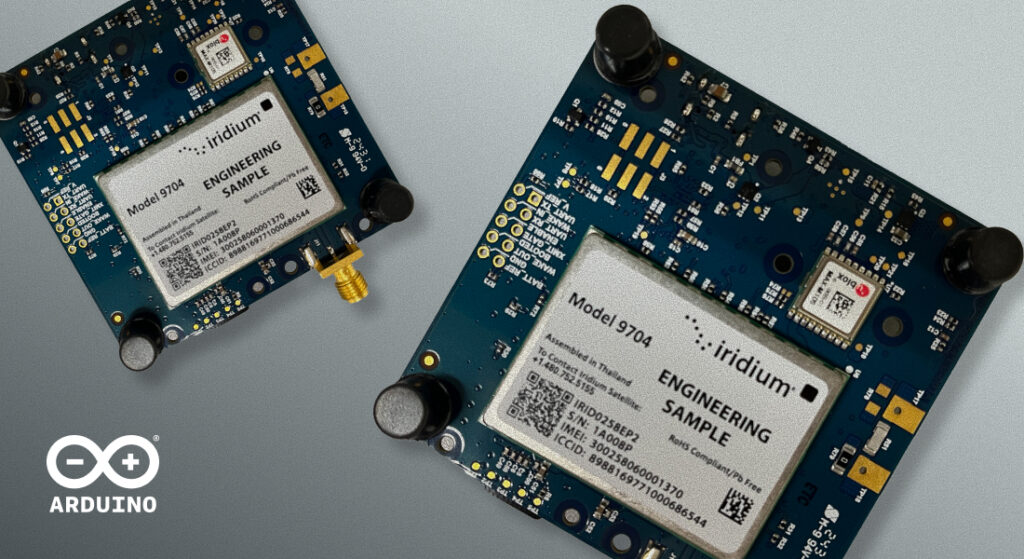By Arduino Team
IoT (Internet of Things) devices can be very useful, but they do, by definition, require internet access. That’s easy enough when Wi-Fi® is available, and it is even possible to rely on LoRa® and cellular data connections to transmit data outside of urban areas. However, deploying an IoT device to a truly remote location has been difficult and expensive in the past. Now, that’s changing thanks to the new 9704 Development Kit, created by Iridium to make satellite-based IoT accessible.
Iridium’s original incarnation was the first commercial satellite communications provider. Over the course of more than two decades, the company built an impressive constellation of satellites providing data connections from low Earth orbit. The constellation currently consists of 66 active satellites, with coverage across the globe. That coverage is perfect for IoT devices in remote regions and that’s why Iridium teamed up with Device Solutions to help them bring to life their vision for the Arduino-compatible Iridium Certus 9704 Development Kit.
The Iridium Certus 9704 Launch Pad Developer Board is compact at just 67×77 mm and equipped with an Iridium Certus 9704 satellite transceiver module, capable of two-way data communication through the Iridium Messaging Transport (IMT) service. The kit also includes everything else necessary to get started: a 3,000-mAh lithium-ion battery, a helical Iridium antenna with SMA right-angle adapter, a microSD card, and even a USB-C cable.
To make this as accessible as possible, Iridium brought in Device Solutions to ensure the hardware for the Iridium Certus 9704 Launch Pad Developer Board was compatible with the Arduino IDE and ecosystem. That board contains a Microchip ATSAMD21J18A microcontroller, which integrates nicely with everything Arduino.
The board has UART, SPI, and I2C connections available, as well as 22 digital I/O pins. Of those, 12 are also PWM (pulse-width modulation) pins, 8 are analog input pins, one is an analog output pin, and 14 can act as external interrupts. As with any other Arduino-compatible development board, developers can use those connections and pins to read data from sensors or control components, like LEDs and motors.
Other onboard hardware includes a u-blox MAX-M10S GNSS (Global Navigation Satellite System) module, a Texas Instruments BQ24195L IC for battery management, a momentary pushbutton, and a piezo buzzer.
Put that all together and you have a capable Arduino-compatible development board with satellite connectivity via Iridium’s robust service. The Iridium Certus 9704 allows for messages up to 100 kB in size, which is plenty for the vast majority of applications. And it has an 83% reduction in idle power consumption (compared to transceivers of the previous generation), which allows for extended operation on battery power.
Device Solutions is proud to have supported Iridium in their creation of the Iridium Certus 9704 Development Kit to democratize satellite IoT. Iridium’s Executive Director of Product Engineering, Garrett Chandler, said, “the uptake of this product into the market has exceeded even our own highest expectations – and I strongly believe it is due to the Arduino-centric strategy we employed when designing the product and the user experience.”
If you’d like to dive into satellite IoT for your next deployment, you can request to order an Iridium Certus 9704 Development Kit on the Iridium website.
The post Dive into satellite IoT with the new Arduino-compatible Iridium Certus 9704 Development Kit appeared first on Arduino Blog.
Read more here:: blog.arduino.cc/feed/






